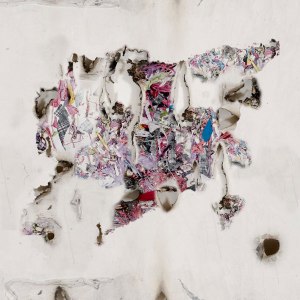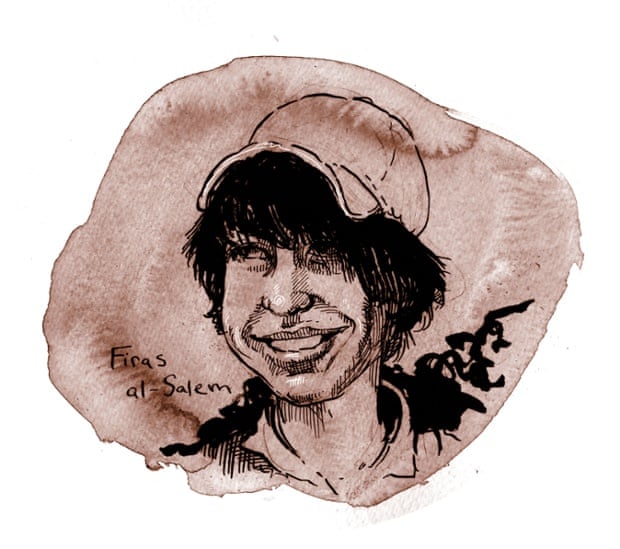http://tahriricn.wordpress.com/2014/08/ ... kable-war/Syria in Revolt: Understanding the Unthinkable WarAUG 20By
Sadik J Al-Azm Burning Syria, Tammam Azam
Burning Syria, Tammam AzamThe people’s intifada in Syria, against the military regime and police state of the Assad family, took me by surprise. I was fearful at first that the regime would crush it almost instantly, given its legendary ferocity and repressiveness. Like other Syrian intellectuals, I felt total impotence before this devouring monster, which precluded any thought of an imminent, or even possible, collective “no.”
I was surprised by the revolution, but I should not have been. Daily experiences and recurrent observations foretold a crisis that many Syrians tried hard to deny. And deny we did. Let me explain.
After the violent suppression of the Damascus Spring in 2001–2002 and again after the assassination of former Lebanese Prime Minister Rafiq Hariri in Beirut in 2005, which led to the humiliating withdrawal of Assad’s troops from Lebanon, angst spread throughout Syria. I was working in Damascus, where the trepidation was especially pronounced. The country, it seemed, was teetering on the edge of an abyss.
But life flowed routinely on the surface. Talking about the situation publicly was out of the question. Even hinting at it was dangerous. When someone did speak up, others quickly changed the subject. A conspiracy of silence was the order of the day.
This period marked a palpable deterioration in relations among Syrians. Sectarian lines hardened, undermining long-standing friendships, harmony among colleagues, and the daily interactions of citizens. Even our way of joking changed.
Like many in Damascus, I found myself beginning, almost unconsciously, to weigh every word according to the religious affiliations of passing acquaintances and close friends alike. Social engagements lost spontaneity. Confidence and trust evaporated, and offense was taken more quickly than ever before. An unusual dose of suspicion seeped into the Syrian intelligentsia’s traditional solidarity against oppression.
By 2009–2010, it was impossible to go about the day without repeatedly hearing from working people expressions such as, “All it needs is a match to ignite,” “It needs a spark to flare up,” and “All it needs is a fire-cracker to explode.”
More educated Syrians, particularly intellectuals, had their own favorite metaphors. Mine was a pressure cooker, where the heat is mounting and the safety valves have been destroyed. Yasine Haj Saleh, a former political prisoner and the most prominent underground commentator and critic on behalf of the revolution, as well as a fine writer of prison literature, warned that if the people did not quickly find a way of letting their “Syrianness” prevail, the country would be in for the worst. The cartoonist Ali Ferzat said in a 2007 Newsweek interview, “Either reform or le deluge.” In 2011 Ferzat was assaulted by regime thugs and left for dead on the side of the road, but he survived.
A prominent colleague and friend in the philosophy department emphasized the inevitability of a civil war because the worst had already happened: the antagonistic Sunni-Alawi divide in Syrian society is a fait accompli, he told me. War was preordained.
Others maintained that one thing could be said for the regime: it alone was holding Syrians back from massacring each other.
Had you asked me what would happen if the tsunami that started in Tunisia reached Syria, I would have answered: the Sunni of Hama would sharpen their knives and pour out into the neighboring Alawi villages to take revenge for the rape and destruction of their city by Assad’s storm troopers in 1982.
But sectarian slaughter did not come to pass. Instead, the unthinkable happened: a people’s revolution against the regime.
• • •
How did we fail so badly in predicting this outcome? Denial was not the only factor; a number of ideas and questions were the talk of the town during this crucial period, at all levels of society. Many of these ideas, especially among intellectuals and elites, were wrong.
Some felt the alliance of Sunni and Alawi upper crust would end, thereby weakening the regime in the absence of any uprising. I once called this alliance the merchant-military complex; a new generation of activists and analysts dubs it the merchant-military-financial-security-complex. This is the ruling class.
All Damascus knows that the army, Ba’ath Party, security agencies, Soviet-style managed economy, and state administrative apparatus—all Alawi-dominated—represent one side of the complex. The other side—urban and business-minded—is dominated by Sunnis.
The people who run this complex have over the years formed an arrogant and corrupt elite. The men manage the day-to-day affairs of Syria, and on their own time they close deals, interact socially, and arrange marriages between their children. They party together, frequent the same restaurants and clubs. Their wives, mothers, sisters, and female cousins attend the same cultural and philanthropic events. Both sides despise each other, but they tolerate each other’s hatred because their relationship is mutually beneficial.
According to today’s younger analysts, the two sides have coalesced into an insolent, Brahman-like upper caste that sees itself beyond all accountability, with an assumed right to lord over the common people, whom they regard as no more than rabble—ignorant, backward, unprepared for democracy, and undeserving of liberty of any sort. Each side is strong in its destabilizing capacity but weak in its constructive power, so they stick together in the face of any possible opposition.
Before the Intifada, intellectuals, in particular, mistakenly believed that the Sunni bourgeoisie might wrest power from their Alawi counterparts, bringing to an end their costly relationship. Costly because the merchants were sick of being blackmailed; paying tributes, commissions, bribes, kickbacks, and protection money; and fronting false business partnerships. However, the complex proved sturdier than anyone had predicted. “The essence of Damascus is trade and politics,” as Syria’s most famous poet, Adonis, put it. The bourgeois core of Damascus has remained true to its essence.
Another erroneous belief within the intelligentsia held that corruption in Syria might decline in favor of the rule of law. This idea was bolstered by the theory that aggressive corruption at the top is a form of “primitive capital accumulation,” as Karl Marx called the phenomenon. Eventually Syria’s primitive accumulators might reach the stage where they had a vital interest in establishing law and order so as to protect their loot. Old American Westerns were recalled, in which the bandit moves away with his ill-gotten gains to a far-off place and reinvents himself as a legitimate businessman, a pillar of the community, and eventually sheriff of the county. The speculation was wrong.
Another view, which proved false, was that the crushing power wielded by the regime through its exploitation of fissures within Syria’s Ahli society—an Arabic pre-civil societal order similar to the German Gemeinschaft—made any kind of organized popular opposition unthinkable.
Ahli society is characterized by the primacy of familial relations and forms of social organization—kinship, tribe, village, ethnicity, religious sect and so on—each with its own asabiyya. The concept of asabiyya comes from the medieval Arab historian Ibn Khaldun and is usually translated as “group solidarity.” But that is too weak a term; it fails to communicate the powerful charge of fanaticism and intransigence within the asabiyya.
The regime fragmented whatever civil society Syria may have achieved by energizing latent asabiyyas. It did so by manipulation—by idolizing the ruling family, co-opting the notables and chiefs of various communities and pitting them against each other, and underwriting rampant crony capitalism that enriched the favored few at the expense of the majority, especially the Sunni. This is also how the Damascus Spring was so swiftly and brutally crushed.
Syrians at the highest reaches of power might have seen change coming, but they refused to act on what they likely knew. Before the revolt, disbelieving minds asked whether the incendiary situation really escaped the attention of the establishment and its inner circle, in spite of all the spies and surveillance, the intelligence services including the ubiquitous Mukhabarat with its innumerable branches and extensions. Some well-meaning optimists argued that the state would wake up eventually and, for self-preservation if nothing else, do something to avert the worst.
Some intellectuals argued that the inner circle and its accomplices refused all reforms because they thought any tampering would lead to the collapse of the whole system. Alawi elites whispered about the absolute priority of survival. By 2005 Assad’s early promises of reform had slid back to the more technical and vague talk of development and modernization. This backward march culminated that year in former Deputy Premier for Economic Affairs Abdulla Dardari’s “Five Year Plan for Deregulation,” which he explained to Senator John Kerry at a dinner party in Damascus hosted by U.S. Ambassador Margaret Scobey. When Kerry pointed out that deregulation and five year plans do not go together, Dardari responded, “We have to call it that.” I was at that event and cut in to ask, “Why don’t you tell us, the people, what you are really doing?” Silence prevailed. I was supposed to understand that deregulation was a lie no one was supposed to notice. Now we know that this deceit failed miserably.
During the last two years, I had the opportunity to discuss Syria’s predicament with business elites—some of them distant relatives—implicated by their own admission in the rampant high-level corruption. They all confessed that, even a few months before the start of the Intifada, they were optimistic about the future of the country and its economy. They were investing generously, negotiating all sorts of agreements with incoming German investors, and closing highly profitable deals with outgoing Dutch business delegations.
Benefitting from business as usual, they thought that the power structure was invincible and that common people were too submissive to protest. These tycoons had, they said, no clue about what was in store, and all expressed disbelief about what had happened to them and regretted their shortsightedness. They lost a great deal—above all the favorable treatment of Assad’s Syria—and quickly immigrated to greener pastures.
Finally, the Sunni majority hoped and anticipated that the United States would help to deliver Syria to them, as it had Iraq to its Shi’a majority. Damascus murmured with wonder: if the Shi’a could have Iraq, why couldn’t the Sunni have Syria? In fact, the panic created by regime change in Iraq only tightened Assad’s grip. As for the expectation of American assistance, Syria’s Sunnis would be gravely mistaken.
• • •
When the intifada began in January 2011, small demonstrations gently pierced the calm in the souk and Damascus’s Omayyad Mosque.
To everyone’s surprise the real eruption occurred in the rural south, in the Hauran district and its capital, Dar’a. The region is traditionally known as “the reservoir of the Ba’ath,” since it supplied party and state with a high proportion of their functionaries and second-rank leaders. The Ba’ath had billed itself as the party of the workers and peasants, but this presumption proved wrong when the workers and peasants openly revolted.
I will not rehearse the Dar’a story here, as it is famous and has been covered well: the school children scribbling anti-regime graffiti on walls, their arrest and torture by the Mukhabarat, the humiliation and degradation to which their parents and families were subjected.
Soon after the Dar’a incidents and the subsequent repression and killings, much of Syria found itself in an all-out protest against the regime. At first, security and military agencies tried to intimidate peaceful demonstrators using the tactics of shock and awe. This phase of repression culminated in Homs, where protesters attempted to replicate Cairo’s Tahrir Square experience with a large gathering in their city’s main square. They were met by the revolt’s first massacre of nonviolent, civilian demonstrators.
With the protest movement spreading in spite of mounting casualties, the repression went into what may be called the Pinochet phase: schools, stadiums, hospitals, soccer fields, and public facilities became mass detention centers; prisons overflowed with random detainees; torture reached an all-time high.
When the Pinochet phase also failed to quell the protest movement, the repressors moved on to the Samson option: tearing down the temple of Syria on everybody’s head. Villages, towns, and city quarters were razed to the ground; crops and forests set on fire; schools, hospitals, university buildings, and health centers were systematically bombed and destroyed. Doctors, pharmacists, nurses, and other health care personnel were imprisoned or killed. The Samson phase reached its fullest realization in the poison gas attack on Ghouta, a desperate, criminal act.
This ruthless repression was not spontaneous but premeditated and predictable. To many it echoed the words of Rif’at Assad’s entourage from its heyday in the 1970s—that the Assad clan and the Alawis conquered Damascus by force, and if the Sunnis wanted it back, they would get it only as a ruin. All this metamorphosed into the regime’s current slogans of “Assad or no one else” and “Assad or we incinerate the country.” In Arabic, they rhyme.
When sustaining a unified movement proved impossible thanks to the ferocious suppression, observers accused the revolution of lacking leadership and strategy. But this was mistaken. The leadership of the revolution simply looked different than one might expect. The old organized parties and charismatic personalities were replaced by youthful local coordinating committees known as tansiquiyat. These committees led and energized the street power of the revolution and continue to be responsible for what is left of its nonviolent side.
Despite the spontaneity of the committees, they have been able to knit themselves into a national network and to maintain contact with similar activists in Syria, the Arab world, and across the globe. With great expertise, they use the most up to date forms of electronic communication to further their revolutionary agenda. They have been able, as well, to frustrate the military regime’s efforts to block the flow of information by producing a steady stream of real-time images and information concerning what is actually taking place on the ground.
Add to that the various innovative art, music, performances, plays, dances, balloons, prayers, satirical cartoons, sarcastic comments, and critical graffiti that this revolutionary generation resorts to in resistance, and you have what I would call the finest hour of Syrian civil society. The carnivalesque spirit in these practices—in the Bakhtinian sense of mocking and deflating the pretensions of high power and oppression—was unheard of in the classical struggles of decolonization but has been a consistent feature of contemporary protest, especially the Arab Spring.
The armed counterparts of the coordinating committees, dispersed all over Syria, forced the regime’s storm troops to spread themselves thin, scattering and exhausting them as they shuttled suddenly from Dar’a in the south to the Turkish border in the north and then back south again. This is why we heard that troops invaded, occupied, and then retreated from Dar’a at least twenty times during less than fifteen months.
At the moment it seems an uneasy stalemate prevails between the military and the revolution. But there is something deceptive about this appearance.
Consider where each of the two sides started. Before the uprising, the regime’s security agencies saw themselves as invincible, a granite block; anything that bumped into them would crumble to dust. Indeed many jailed dissidents reported upon release that during interrogation and torture officers would warn them: “Why do you bother to criticize, oppose, and protest, when you know we are invincible, with a will of steel that crushes anything and anyone that stands in its way? Find something better to do than dabbling in hopeless politics and opposition.”
The revolution has destroyed this omnipotent image both within the regime and outside of it. That is why Assad had to call on Hezbolla militias from Lebanon and paramilitary Shi’a organizations from Iraq and Iran to bolster his hold on the country. That is also why his storm troops, Hezbolla, and the other militias struggled so long to take a small, rural town such as Kusair, in spite of their far superior numbers and firepower.
Damascus, in particular, is now atoning for having watched from a comfortable distance the savage destruction and pillage of Hama and its people in 1982; for having quietly tolerated for so long the arbitrary arrest, imprisonment, torture, murder, and disappearance of countless citizens; for accepting almost as a natural fact the extermination of more than one thousand souls in the Palmyra Prison Complex in June 1980; for having shamelessly swallowed the indignity of turning the republic, in no time, to hereditary dynastic rule; and for having seen the Damascus Spring—Syria’s last flicker of hope—brutally crushed without batting an eye.
Just as misconceptions among Syrians failed to predict the intifada, international discourse around the revolution has failed, perhaps willfully, to understand it and respond properly.
One issue at the heart of the confusion is how a largely peaceful, youthful civilian protest movement turned into an armed revolution in less than a year. This is particularly pressing given the disdainful language President Obama has used to describe the common people’s protest movement.
This past March, in a long and frank interview with Jeffrey Goldberg of Bloomberg View, Obama described the Syrian conflict as “a professional army that is well-armed and sponsored by two large states [Russia and Iran] . . . fighting a farmer, a carpenter, an engineer, who started out as protesters and suddenly now see themselves in the midst of a civil conflict.”
This description is mistaken. There was nothing sudden about the transformation of the peaceful protests into armed “civil conflict.” It was the result of the abandonment of the protestors by the international community in spite of the escalating violence perpetrated by the Assad regime, the solidarity of Syrian soldiers with ordinary people, and the predictable influx of armed extremists to a desperate situation.
The realpolitik mindset of the international community reduces the crisis in Syria to ridding Assad of his chemical weapons and then reinstating him, despite accusations that Obama and Kerry have heaped on him: criminal, murderer, tyrant, and even a new Hitler. Syrians understand this.
Hardly any Syrian believes the United States is the hero of the chemical weapons deal. Syrians knew that the chemical weapons stockpile alarmed the major powers from the beginning of the intifada. Russia gave public assurances and private guarantees to its “partners” that the Syrian chemical weapons were fully under control and would not fall into the wrong hands. When Assad made limited use of diluted chemical agents against civilian centers to test the West’s tolerance, Russia doubled down on its assurances. This helped Obama draw his famous red line and declare the use of such weapons a “game changer,” but his threat was irrelevant to the eventual agreement on the weapons.
In fact, as Obama admitted in the Bloomberg View interview, Syria was responding to pressure from Iran and Russia: “In the span of 10 days to two weeks, you had their patrons, the Iranians and the Russians, force or persuade Assad to come clean on his chemical weapons, inventory them for the international community, and commit to a timeline to get rid of them.”
Furthermore, Syrians remember that Kerry, trying to bolster his indictment of the regime, mentioned that the United States knew three days before the Ghouta assault that the chemical agents were being mixed, prepared, and mounted on delivery systems for attack. In other words, Kerry knew beforehand what crime was coming but failed to do anything to stop it.
The whole episode reveals a common pattern: when faced with a serious threat, tyrants such as Assad capitulate. Hafez Assad, Bashar’s father, did so when he turned over the Kurdistan Worker’s Party (PKK) leader Abdullah Öcalan to Turkey in 1998. After years of resistance and denial, Hafez buckled the moment the Turkish military threat became imminent. The same pattern repeated itself in 2005 when Bashar capitulated under pressure from President George W. Bush and the European Union, especially France, and withdrew his troops from Lebanon. Both Assads fit the profile drawn long ago by the Frankfurt School of the petty fascist personality in power: cruelty and contempt for the weaker and craven servility before the stronger.
After the strong seized the chemical agents, a no-less-lethal weapon went into effect against the weak: siege tactics to force the population into submission. The regime calls this, “Kneel or starve.” The international response has been silence.
Syrians also understand why Western realpolitik requires the international community’s effective position on Syria today: “let it bleed,” as the journalist Christopher Dickey put it. The main contenders in this macabre drama—Syria, Iran, Hezbolla, al Qaeda plus an assortment of Islamists, jihadists, and Talibanis—all have longstanding and confirmed anti-Western credentials. Why stand in the way of your enemies while they kill each other? Obama himself says Syria is “bleeding them”—Iran, Hezbolla, and the Sunni extremists fighting in Syria. The political value to the United States is unmistakable. The rest of the West has also walked away for similar reasons.
So President Obama has thrown up his hands, in part on the basis of a convenient but faulty excuse about dentists and farmers. And he professes ignorance as to how the peaceful protests became an armed revolution, as evidenced by his mistaken view that the fighting was a “sudden” turn of events. At least three factors beyond the aggression of the regime helped to turn the nonviolent demonstration into a war, all of which should have been visible to Western intelligence.
First, most of the educated and skilled leaders who energized the initial, nonviolent phase of the intifada quickly ended up in jail, permanently impaired, exiled, or dead. They were replaced by less educated and less progressive leaders disillusioned by the peaceful character of the protest movement.
Second, the formation and rise of the Free Syrian Army spurred the militant revolution. This, too, was foreseeable—a consequence of the defections, at all ranks, from the regular army after soldiers were called upon to suppress the uprising with unrestrained violence. At great risk to their lives and the lives of their families, they refused orders to bomb villages and people like their own. Syrians should be thankful that their army is still a conscripted people’s army, not a professional one.
Finally, the stakes for both sides in this struggle are high enough that the resort to arms should have come as no surprise. On the one hand, the Alawis have so much to lose that they will stop at nothing to maintain power. On the other, the revolting Sunni are dug into their position, willing to retrieve Syria at any cost. It all seems to boil down to the old paradox: What happens when an irresistible force meets an immovable object? Anything and everything.
Alongside these misconceptions about who is fighting in Syria and why the peaceful movement degenerated into violence, international discourse is also flawed when it comes to the nature of the conflict.
Syria is incorrectly lumped in with other sectarian conflicts, such as Lebanon’s. There, communities, sects, and factions attacked and fought each other ferociously while the state pretty much stood by helplessly. Another example is Iraq, where the U.S. occupation abolished the state, the army, and the ruling party, leaving the Shi’a, Sunni, and Kurds to mobilize against each other.
In Syria the regime, state, army, and party on one side, and the popular uprising on the other, are the primary combatants. There are no indications of sectarian contest. Syria’s Druzes are not about to attack their Sunni neighbors in Hauran, nor are the Sunni preparing to invade en masse Ismaeli or Christian territories, nor are the Ismaelis readying themselves to violently settle old scores with the Alawi community and so on. Neither did any Syrian community, sect, or ethnicity mobilize itself collectively to fight on the side of the regime or to defend it.
Syria is not in a condition of generalized civil war. If a historical precedent or analogy is needed, recall Hungary’s armed revolution against the Stalinist regime there in 1956—a revolt crushed by Russian tanks much as Syrian tanks aim to crush today’s. As Hungary’s revolution unfolded, no one said that the country was in the throes of a civil war because Hungarian was killing Hungarian.
Perhaps it is because the international community wrongly sees sectarian violence that, outside Syria, there is such concern about the country’s minorities—Kurds, Christians, Alawis, Druzes, Ismaelis, Turkoman, Circassians, and so on—and their rights. This at a time when the Sunni majority of the country is getting a savage beating from the storm troops, militias, and scud missiles of a small militarized minority that monopolizes the power and wealth of the country. The cities that have been destroyed are Sunni cities, while minority communities have remained relatively safe and calm. The large majority of the more than 200,000 killed so far, of the wounded, of the permanently impaired, of the disappeared and vanished, of the imprisoned and tortured are Sunni. Most of the millions who have been exiled and internally displaced are Sunni.
So what is trampled underfoot in Syria right now is the majority and its rights, about which no one seems to speak outside of Syria. Underlying this silence is the assumption that the Sunni majority is just waiting for the right moment to assault the minorities of the country, to persecute and oppress them. But, right now, all Syria, needs rights, protection, concern, and attention.
This international discourse about protection of Syria’s minorities takes me back to the Europe of the nineteenth century, with its famous gunboat diplomacy. Every European power worth its salt was searching for a minority in our part of the world to adopt and protect: France, the local Roman Catholics and Alawis. Russia, the Greek Orthodox. Britain, the few Anglicans and Protestants along with the Druze minority, and so on. Today Russia wants to be the protector of all these minorities and to replace France as the main guardian of the Christian and Alawi minorities, in particular.
As in the past, at present the international community sublimates Syria to the ethereal levels of grand geopolitics, a pawn in the game of nations. Little attention is paid to the internal springs and dynamics of the revolution itself, something I am trying to emphasize. It’s not just the realpolitik strategists of the major powers who think this way. A segment of the left, both Arab and international, buys into a version of this approach in its view that the revolution is an imperialist plot against the only regime that still stands up to Israel and remains an obstacle to Western domination of the Middle East, its countries and resources. Most on the Arab left promote civil society and human rights, but a minority, seeking to continue the old anti-imperialist fight.
With Syria and its intifada absorbed into grand-strategic conflicts, the reality of the people’s oppression is at best neglected; at worst it becomes irrelevant. This is a grave error because the longer Bashar Assad and his police state cling to power with Sukhoi airplanes and Scud missiles, the greater become the dangers of extremisms.
For, in all societies, in moments of severe crisis, people turn to God. This brings solace and endurance, and sometimes it brings desperation and holy vengeance. The high-tension Islam now coursing through Syria promotes the recruitment of young Islamists, Muslim Brothers, jihadis, Talibanis, suicide bombers, and extremists of all stripes.
When genocidal dictators are applauded and adulated in the language of the eternal, is it surprising that the oppressed counter by raising their own banners of eternity? When the arbitrary law and order of the Ba’ath police state is discredited and reviled, is it surprising if people revert to customary law and order, which, naturally, contain a high dose of shari’a?
The way out of the impasse is not simply to decapitate the murderous system by removing Assad and leaving the criminal police state beneath intact, all in the name of stability, continuity, and an orderly transfer of power. Neither is it in the Godot of
Geneva’s conferences.
The solution can come only with the termination of political Alawitism. This is pretty much the way the Taef Agreement, in 1989, brought the Lebanese civil war to an end—by jettisoning political Maronitism and its predominance over Lebanon. In Syria’s case, that means the end of the dynasty, the end of Alawi supremacy, the end of the sway of the minority, and the rebirth of the republic. The West does have a role to play. Instead of letting Syria bleed, the West needs to help end Assad’s grip on the country and its future and negotiate political accommodation for Alawis within a democratic framework that will necessarily favor the Sunni majority. The West will inevitably intervene because the great powers will not permit Syria to fall into the hands of jihadi Islam. The question is whether that intervention will be guided by a proper understanding of the war.
As I write, no one claims to know where Syria is heading or what will end the bloody struggle. Still, I am certain that the Assad and Alawi dynasties will never rule again.









